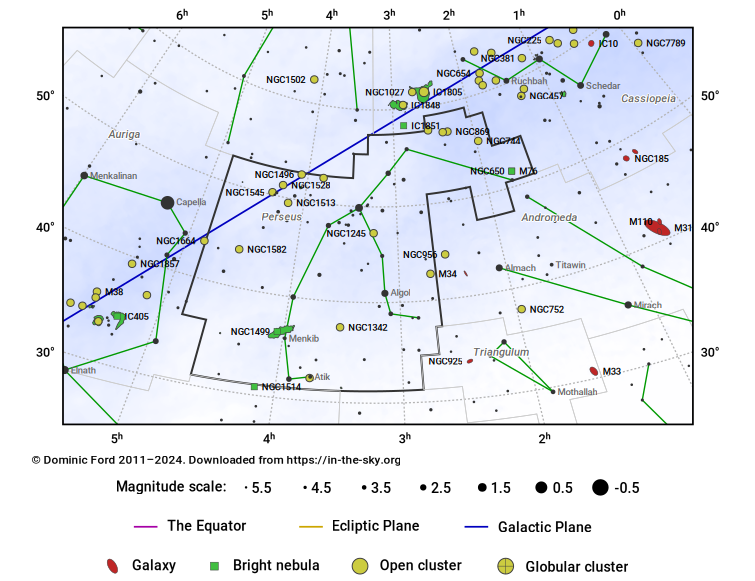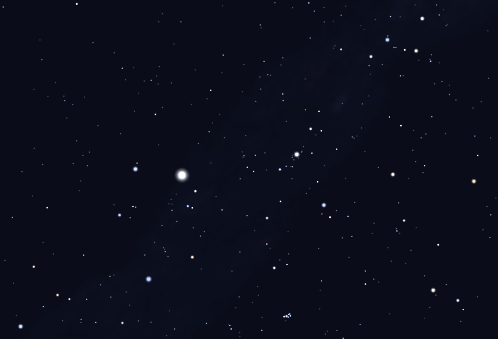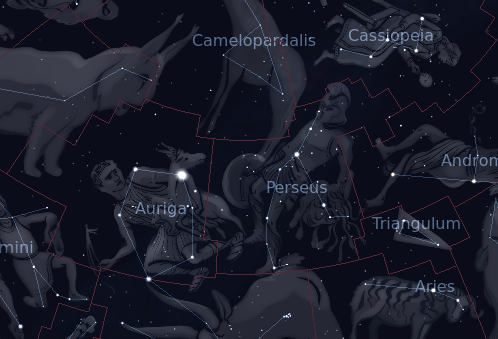The Constellation Perseus
Perseus is a northern constellation which appears highest in the evening sky in the months around November.
It is prominent from dark sites, having 16 stars of fourth magnitude or brighter. However, only two of these are prominent from light-polluted locations: Mirfak and Algol.
Perseus is perhaps best known for the Perseid meteor shower, one of the best annual meteor showers, whose radiant lies close to η-Per.
The Milky Way also passes through this area of the sky, where it forms a particularly broad band of deep sky objects, including over a dozen bright open clusters.
Among these, the most celebrated are NGC 884 and NGC 869, known as the double cluster.
In Greek mythology, Perseus was the husband of Andromeda, who is represented beside him on the sky. Among Perseus' many heroic exploits, he rescued Andromeda from a sea monster (possibly represented by Cetus) and slew the Gorgon Medusa, from whose body sprang the winged horse Pegasus.
Ancient
1.5% of the sky
615.0 square degrees
The following constellations neighbor Perseus: Andromeda, Aries, Auriga, Camelopardalis, Cassiopeia, Perseus, Taurus, Triangulum.
Hover the pointer over the name of an object to highlight its position on the starchart to the right, or click to see more information.
| Stars | Open Clusters | Globular Clusters | Galaxies |
| Mirfak (mag 1.8) | Caldwell 14 (mag 4.3) | NGC 1023 (mag 9.3) | |
| Algol (mag 2.1) | Messier 34 (mag 5.2) | NGC 1058 (mag 11.2) | |
| ζ-Per (mag 2.8) | NGC 869 (mag 5.3) | NGC 1169 (mag 11.4) | |
| ε-Per (mag 2.9) | NGC 884 (mag 6.1) | NGC 1003 (mag 11.5) | |
| γ-Per (mag 2.9) | NGC 1545 (mag 6.2) | IC 284 (mag 11.6) | |
| δ-Per (mag 3.0) | NGC 1528 (mag 6.4) | NGC 1275 (mag 11.6) | |
| ρ-Per (mag 3.4) | NGC 1444 (mag 6.6) | NGC 1272 (mag 11.9) | |
| η-Per (mag 3.8) | NGC 1342 (mag 6.7) | NGC 1161 (mag 11.9) | |
| ν-Per (mag 3.8) | NGC 1582 (mag 7.0) | NGC 1265 (mag 11.9) | |
| κ-Per (mag 3.8) | IC 348 (mag 7.3) | NGC 1174 (mag 12.3) | |
| Atik (mag 3.9) | NGC 957 (mag 7.6) | NGC 1278 (mag 12.4) | |
| τ-Per (mag 3.9) | NGC 744 (mag 7.9) | NGC 1167 (mag 12.6) | |
| MX Per (mag 4.0) | NGC 1245 (mag 8.4) | IC 257 (mag 12.7) | |
| φ-Per (mag 4.0) | NGC 1513 (mag 8.4) | IC 310 (mag 12.7) | |
| Menkib (mag 4.0) | NGC 1496 (mag 9.6) | NGC 1175 (mag 12.8) | |
| ι-Per (mag 4.0) | NGC 1605 (mag 10.7) | NGC 1160 (mag 12.8) | |
| θ-Per (mag 4.1) | NGC 1220 (mag 11.8) | NGC 1250 (mag 12.8) | |
| μ-Per (mag 4.1) | NGC 1193 (mag 12.6) | NGC 1282 (mag 12.9) | |
| 16-Per (mag 4.2) | NGC 1348 | NGC 1122 (mag 12.9) | |
| e-Per (mag 4.2) | NGC 1548 | NGC 1267 (mag 13.0) | |
| λ-Per (mag 4.3) | NGC 1270 (mag 13.0) | ||
| ψ-Per (mag 4.3) | NGC 1233 (mag 13.2) | ||
| σ-Per (mag 4.3) | NGC 1273 (mag 13.2) | ||
| 17-Per (mag 4.6) | NGC 1294 (mag 13.3) | ||
| b Per (mag 4.6) | NGC 1281 (mag 13.3) | ||
| ω-Per (mag 4.6) | NGC 1293 (mag 13.4) | ||
| π-Per (mag 4.7) | IC 292 (mag 13.5) | ||
| f-Per (mag 4.7) | NGC 1050 (mag 13.5) | ||
| 34-Per (mag 4.7) | NGC 1171 (mag 13.5) | ||
| k-Per (mag 4.8) | NGC 1277 (mag 13.5) |




